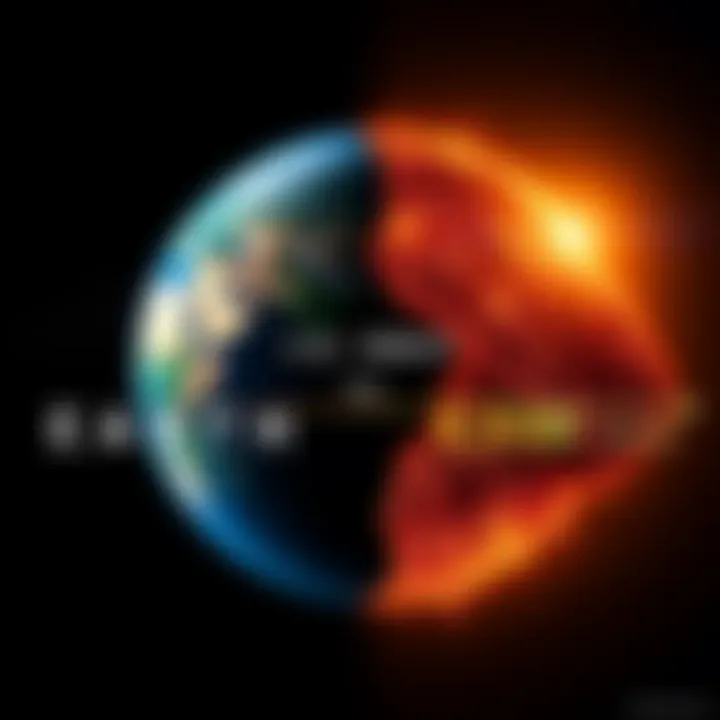Earth’s Age Challenges Views on Human Civilization | Is 6,000 Years of Humanity an Understatement?
Edited By
Lucas Braun

A heated debate is emerging around the origins of human civilization versus geological timelines, following a provocative claim about the age of the Earth and the beginnings of civilization. People are questioning assertions that human society began just 6,000 years ago, contrasting it with widely accepted scientific data.
Clash of Perspectives on Civilization Timeline
Comments point to extensive archaeological evidence contradicting the idea that civilization only started a few millennia ago. For instance, one participant argued that the Stone Age lasted around 3.4 million years and that evidence of controlled fire dates back 1.7 to 2 million years. This timeline dramatically shifts the foundation of civilization, which is thought to have roots dating back 12,000 years.
"The earliest human-made bed found is 200,000 years old," noted a comment, indicating that humanity's journey has been far longer and more complex than suggested by those who claim a brief civilization era.
Gobekli Tepe and the Case for Advanced Societies
Gobekli Tepe has emerged as pivotal evidence for those who argue for ancient civilizations being older than current scientific consensus. This archaeological site, believed to be over 12,000 years old, sparks curiosity about what prior societies established before known civilizations like ancient Sumer.
Many argue that assumptions about the timeline of human development are naive. "Modern man’s hubris, to think that we know it all,” said one commentator, denouncing the narrow perception of humanity's developmental history.
Persistent Skepticism and Conspiracy Theories
Moreover, conspiracy theories about hidden evidence augment the debate. Some people believe that advanced ancient civilizations akin to modern society existed but are buried beneath layers of history, suggesting that significant archaeological finds might still await discovery. An anonymous commentator said, "The only reason they would be restricting access [to Antarctica] is that they are protecting something they don’t want anyone to find out about.”
Participants express a range of sentiments about the official narratives regarding civilization's timeline. The clash between skeptical and supportive attitudes has created a fertile ground for discussions on esoteric spirituality and the probabilistic existence of lost advanced civilizations.
Key Insights
🚀 Many argue human civilization dates back over 12,000 years, radically challenging the notion of a 6,000-year timeline.
🏛️ Gobekli Tepe serves as key evidence of long-established human society well before recorded history.
🔍 The debate is compounded by conspiracy theories suggesting hidden evidence regarding ancient technology and civilizations.
With the persistent questioning of established narratives, this conversation illustrates a broader unrest regarding humanity's past and future interpretations. Could we be on the brink of a historical reevaluation that transcends conventional wisdom?
Despite ongoing discussions, the conflict between scientific evidence and alternative beliefs seems poised to continue.
What Lies Ahead for Humanity's Timeline
Predictions suggest the conversation around humanity's timeline will continue to intensify, particularly as new archaeological finds emerge. Researchers estimate there's a strong chance that more evidence supporting extended historical timelines will surface in the next decade, potentially increasing acceptance of pre-Sumerian societies among scholars. With public sentiment leaning toward curiosity rather than skepticism, this shift may pave the way for a broader acknowledgment of forgotten chapters in human history. Some experts even foresee a 60% probability that previously unexplored sites will yield artifacts that push back the recognized timeline of civilization by several thousand years, prompting necessary revisions in history books and educational resources.
A Parallel from the Shadows of History
The ongoing debate over ancient civilizations can draw a curious parallel with the early days of space exploration. Just as scientists once dismissed the notion of life beyond Earth as fantasy, we now stand at the brink of recognizing our past's complexity, which might be equally profound. Consider the efforts to decode messages from deep space—a modern obsession fueled by whispers of sentient life. Similarly, the quest to unearth humanity's lost past relies on a blend of skepticism and curiosity, showing that both the sky above and the ground below hold secrets waiting to be revealed. As history shows, it often takes a collective leap of faith to embrace possibilities that challenge the status quo.
